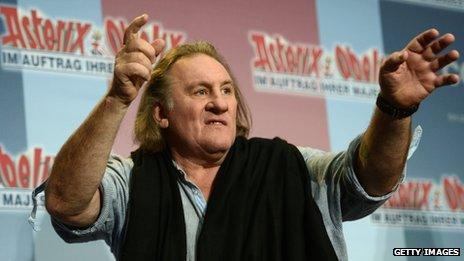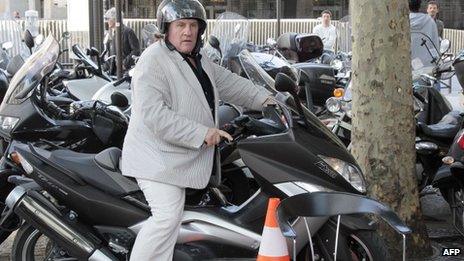Gerard Depardieu: French film star stirs tax row
- Published

He is "the great force of nature", "the Charolais bull", "the circus acrobat at the bottom of the pyramid".
There is no getting around it. Gerard Depardieu is a big man, both in size and reputation, and over the years has conjured all kinds of wild comparisons.
Marguerite Duras, who directed him in two of his films, once described him as "a big, beautiful runaway truck of a man".
Perhaps she was referring to his physique - but it serves as a pretty good definition of his irascible temperament too.
In recent years, his weight has become the added dimension to his character, both on and off screen. He is a bon-viveur: he loves food and owns several restaurants and vineyards across the globe. He once admitted to drinking five to six bottles of wine a day.
It is a lifestyle ill-suited to his other great passion, motorbikes.
Depardieu has survived 17 (at the last count) motorbike accidents. Last month he was arrested for driving under the influence after falling off his scooter in Paris.
In August he was accused of assault and battery after an argument with a driver who had almost knocked him from his bike.
In his acting career, his trips to Los Angeles have been equally precarious - the 1990 comedy Green Card was a high point, but 102 Dalmatians (2000) and Last Holiday (2006) crashed spectacularly.
And yet his work rate in Europe is ferocious: more than 180 film and TV credits since he began in 1970, including Cyrano de Bergerac, Jean de Florette and The Return of Martin Guerre. That's four-and-a-half films a year for four decades.
The actor claims he has paid 145m euros (£120m; $190m) in taxes since beginning work as a printer at the age of 14 - which brings us to the latest controversy that surrounds him.
'Patriotic responsibilities'
Last week, Depardieu announced he had quit Paris for a small town 800 metres (yards) from the French border, seemingly to dodge a 75% top rate of tax expected to come into force next year.
Prime Minister Jean-Marc Ayrault said it was "shabby", and suggested he was "shirking his patriotic responsibilities".

Aside from his reputation as a bon-viveur, the actor's other passion is for motorbikes
"How pathetic is that," railed the actor in Sunday's Journal du Dimanche.
"I am leaving because you believe success, creation, talent, anything different must be sanctioned," he wrote.
His self-imposed exile is the talk of the French press. France has known nothing like it. Obelix and Asterix fleeing the country? The shame of it. Christian Clavier, who played Asterix to Depardieu's Obelix in the film series, has also moved - to London.
Until now, Depardieu's behaviour has most often been met with a Gallic shrug from his exasperated compatriots - he is who he is, goes the argument. But the tax row is tribal and has divided opinion.
Prime Minister Ayrault - stung by the criticism in Sunday's paper - "clarified" his earlier comments: "I didn't say Mr. Depardieu was pathetic, I said the move was pathetic."
Political dimension
Perhaps this is a good moment to introduce Mr Depardieu's politics. He was a keen supporter of ex-President Nicolas Sarkozy's campaign ahead of the May presidential elections. And so the centre-right UMP leader Jean-Francois Cope was quick to leap to his defence.
"I'm sorry to witness how the Socialist government is bringing our country down," he said. "This fiscal battering is destroying our talents, our artists, creators, researchers, and entrepreneurs - it's insane."
Others were not so charitable. Georges Sarre, a Socialist Paris councillor, blogged: "So sorry to hear Paris resident Gerard D. is struggling to make ends meet, I'll appeal to the Paris Council to see if we can cut social benefits and offer him a ton of Belgian chocolates."
The French film director, Claude Lelouch, was a little more circumspect.
"This is a shameless lynching (of Depardieu)," he said, "but I would like to tell Gerard he is lucky to pay taxes. It means he is successful and that his businesses are going well," he said. "I dream of paying taxes all my life."
The trouble is, plenty don't. There are some 2,800 French living in the same area of Belgium a few minutes' drive from the border, including the Mulliez family, owners of the French hypermarket chain Auchan and the Decathlon sports stores, who have lived there for years. Belgian residents do not pay capital gains tax on the sale of shares or wealth tax.
In its editorial "Le vrai scandal" (the real scandal), the right-leaning newspaper Le Figaro saves the biggest insults for the Socialist government.
"It reveals an absence of common sense on the part of a government that is always insulting rich people," said the paper.
"They should reflect on the wisdom of their own actions rather than attacking those who succeed or show some spirit of enterprise. The young people in this country work hard and want to believe in their fortunes. Why would they want to become cash cows of people who insult them? It's desperate. That's the real scandal!"
- Published16 December 2012
- Published12 December 2012
- Published28 September 2012
- Published18 September 2012